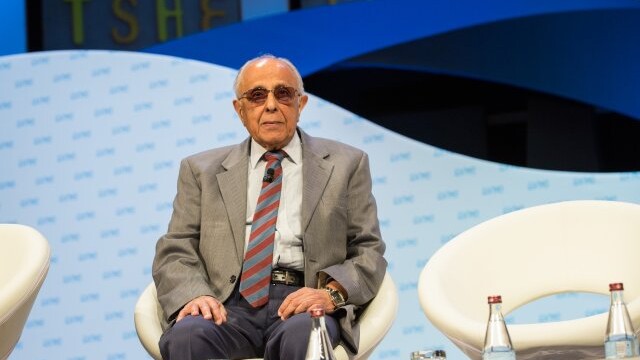
Ahmed Kathrada
South African Politician, former political prisoner & anti apartheid activist
At the age of 17, Ahmed Kathrada participated in the Passive Resistance Campaign of the South African Indian Congress. He was one of 2000 people who were arrested and imprisoned for defying a law that discriminated against Indians.
In 1951, Kathrada was selected to attend a youth festival in East Berlin, jointly organized by the World Federation of Democratic Youth (WFDY), and the International Union of Students (IUS). From there he visited Poland where the Auschwitz Concentration camp left an indelible impression on him. In 1952, Kathrada was in a group of 20, including Mandela and Sisulu who were sentenced to nine months in prison with hard labour, suspended for two years for organising a Defiance Campaign against six apartheid laws. The campaign was jointly organized by the ANC and SA Indian Congress.
In 1954, Kathrada was placed under restrictions by the Security Police and was arrested several times for breaking his “banning orders”. In 1956, he was among the 156 Congress activists and leaders charged for High Treason. The trial continued for four years after which all the accused were acquitted. Kathrada, Mandela and Sisulu were among the last 30 to be acquitted. While they were on trial, in 1960, the ANC and PAC were banned. In 1962, Kathrada was placed under “house arrest”. The following year Kathrada broke his banning orders, and went “underground”, to continue his political work. In July 1963, the police swooped on Liliesleaf Farm in Rivonia, a Johannesburg suburb where Kathrada and other “banned” persons had been meeting. This led to the famous 'Rivonia Trial', in which eight accused were sentenced to life imprisonment with hard labour.
They included Nelson Mandela, Walter Sisulu, Govan Mbeki, Raymond Mhlaba, Denis Goldberg, Elias Motsoaledi, Andrew Mlangeni and Kathrada
Kathrada spent 26 years and three months in prison, 18 of which were on Robben Island.
While in prison he obtained four university degrees: BA (in History and Criminology), BA Bibliography (in African Politics and Library Science), BA Honours (History) and BA Honours (African Politics).
Soon after his release on 15 October 1989, the ANC was unbanned. At its first legal conference in South Africa, Kathrada was elected onto its National Executive Committee. Until 1994 he headed its Public Relations Department. At its Conference in 1997, Kathrada declined nomination to the National Executive Committee. In 1992, Kathrada undertook the Hajj pilgrimage to Mecca.
Kathrada was elected to Parliament in 1994 and served as President Mandela's Parliamentary Counsellor. He was chairperson of the Robben Island Museum Council until his term expired in 2006.
Ahmed Kathrada has received the following awards:
- “Isithwalandwe”; the highest award bestowed by the ANC
- The ANC's Merit Award, for long service
- Presidential Order for Meritorious Service; Class 1: Gold
- Honorary Doctorate: University of Massachusetts, May 2000
- Honorary Doctorate by the University of Durban-Westville, 2002
- Doctorate of Humane Letters by the University of Missouri, January 2004
- Pravasi Bharatiya Samman Award, by President of India, January 2005
- Doctor of Humanities, Michigan State University, December 2005
- May 2011. Honorary Doctorate from the University of Kentucky
- The City of Johannesburg bestowed its highest honour, Freeman of the City, August 2012
- Honorary Doctorate from Wits University, December 2012
Ahmed Kathrada attended One Young World 2013 Johannesburg and spoke during the Special Session: Knowing Nelson Mandela alongside Francois Pienaar, Former South African rugby captain.